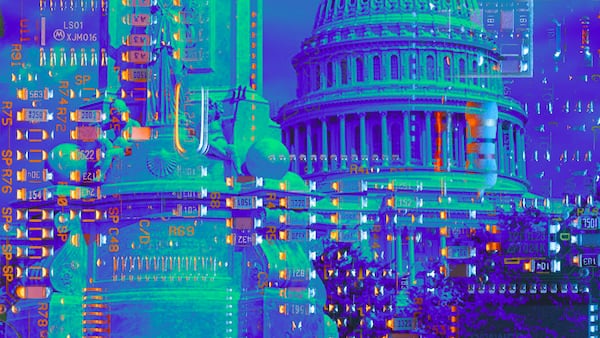- A new bill could change how crypto spot markets are regulated.
- The 162-page Republican bill is an unusual joint effort between two committees in the House of Representatives
The Commodity Futures Trading Commission says it should regulate crypto “spot” markets. A Republican bill unveiled late last week would make this reality.
Spot markets — instant cash markets that exclude derivatives — in crypto are currently regulated at the state level.
The 162-page Republican bill, an unusual joint effort between two committees in the House of Representatives, gives the CFTC “exclusive jurisdiction” over any transaction involving a digital commodity, including cash and spot markets.
Justin Slaughter, policy director at venture capital firm Paradigm and a former advisor to Securities and Exchange Commission and CFTC commissioners, unveiled the bill in detail on Twitter, with a whopping 211-tweet thread.
He wrote that the CFTC has always had jurisdiction over futures contracts on commodities, but authority over spot markets has been limited.
“The CFTC has anti-fraud and anti-market manipulation authority, but that’s enforcement powers only. It’s not forward-looking regulatory powers,” Slaughter tweeted.
“When it comes to crypto, that means the CFTC has been unable to provide regulation of crypto spot markets even though it wants to.”
The CFTC has had anti-fraud and anti-market manipulation authority, but that’s enforcement powers only. It’s not forward looking regulatory powers. 107https://t.co/Ru66aGz9N9
— Justin Slaughter (@JBSDC) June 3, 2023
The overall bill seeks to absorb digital assets into existing market structure. To allow the CFTC to regulate spot markets, it would require exchanges to register as existing market structure entities like so-called “swap execution facilities.”
The House Committee on Agriculture, whose chair Glenn Thompson is a cosponsor of the new draft bill, will hold a hearing on spot markets tomorrow.
NOW READ: These five SEC proposals could alter the course of crypto and DeFi in the US
Some other takeaways from the bill:
- Both the SEC and CFTC have asked for more resources to oversee crypto. The dual committee bill, however, makes no provisions for extra staff or funding.
- The bill seeks to establish a clear path to either CFTC or SEC registration for crypto players, including issuers, exchanges, brokers and dealers. The two agencies would have to issue joint rules clarifying the definitions of securities and commodities.
- Most tokens, particularly those belonging to decentralised networks, would count as digital commodities and therefore fall under the CFTC’s rules. The SEC gets to decide what is a commodity and what is a security, but it must do so within 30 days of application by an issuer.
- The SEC would lose most of its authority over payment stablecoins, apart from some enforcement powers.
- Slaughter tweeted that some definitions in the bill appear to make airdrops legal in the US. Airdrops have existed in a legal grey zone since the SEC banned crypto startup Tomahawk over a 2018 bounty program involving its TOM token.
- The bill does not tackle decentralised finance or non-fungible tokens, dubbed NFTs. It does, rather, compel the government, including the SEC and CFTC, to study them.
- The bill exempts people who perform “ancillary activities” operating and maintaining blockchain networks — including software developers and validators — from SEC regulation.





